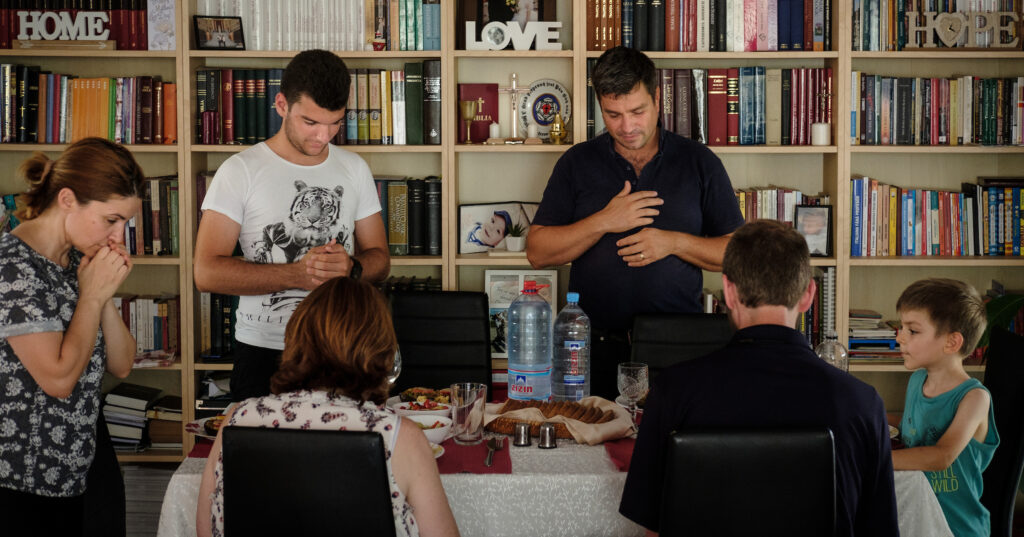Reflections on why we have difficulty studying the Bible regularly at home, and practical tips for home devotions.
What prevents us from studying the Bible?
Christians often struggle to keep up a regular routine of reading the Bible at home. There are several reasons for this struggle. First and most evident to us is our own flesh, which “does not want to hallow God’s name or let His kingdom come” (SC III:3). Our old nature does not want to hear God’s Word, because it exposes the old man in us and condemns him.
It is important to remember, however, that the new man in us, born anew by water and the Spirit (John 3) in Holy Baptism, delights in the law of the Lord and lives by every word that comes from the mouth of God. Routine study of God’s Word puts the old man in his place and raises up the new man in us daily. Through it we enter into the baptismal rhythm of our life under the Word of God: repentance and faith, death and resurrection. God promises to make us new creatures through His powerful Word for the sake of Jesus Christ.
Besides their own sinful nature, Christians often face other challenges that prevent them from studying God’s Word at home. The Bible is sometimes hard to understand, especially for those who have not been properly trained or have not had a good deal of experience reading it. As in any other area of study, one must practice, and make a habit of reading Scripture and becoming acquainted with the Holy Spirit’s voice.
Further, Christians are faced with many duties of life. Even though they desire to please God and serve their neighbor, they have responsibilities that can draw them away from the first things: God’s Word and prayer. Luther is rumored to have said, “I have so much to do that I shall spend the first three hours in prayer.” Whether or not he said it, this echoes our Lord’s words: “But seek first the kingdom of God and his righteousness, and all these things [clothing, food, earthly goods] will be added to you” (Matt. 6:33). We must decide to make our meditation on God’s Word the first thing and let everything else revolve around it.
Martin Luther translated the Bible into German for common people to read because he was convinced that the Sacred Scriptures should be on the lips of Christians at all times. He believed that they are clear and can be understood by every Christian. They are so straightforward, in fact, that some dismiss them as simplistic, even if their riches could never be fully mined to their depths. Luther exhorts us:
I beg and really caution every pious Christian not to be offended by the simplicity of the language and stories frequently encountered there, but fully realize that, however simple they may seem, there are the very words, works, judgments, and deeds of the majesty, power and wisdom of the most high God. … Therefore dismiss your own opinions and feelings, and think of the Scriptures as the loftiest and noblest of holy things as the richest of mines which can never be sufficiently explored, in order that you may find that divine wisdom which God here lays before you in such simple guise as to quench all pride. (LW 35:236)
Short guide to studying the Bible individually
It is almost always best to begin your study of Scripture at home with a concrete routine, whether you are doing this individually or with your family. Use a model that has worked for others.
The two most common ways that Christians have studied the Scriptures privately are, one, to take a short passage and study it carefully, meditating on its meaning, as one may do with Portals of Prayer or Day by Day: 365 Devotional Readings from Martin Luther (CPH), or, two, to follow a broader reading of the Bible, such as reading one whole chapter or more each day. A lot will depend on the time you can reasonably put aside for the task and your abilities as a reader. Whether you are reading a large portion of Scripture or a brief passage, your reading should involve meditating or reflecting on God’s Word.
Devotional readings are often like training wheels. They are intended to prepare you to do it on your own. When you are ready to take off the training wheels of a prepared devotion, I suggest using Luther’s fourfold formula for praying or meditating on a biblical text or text from the catechism: (1) Instruction, (2) Thanksgiving, (3) Confession, and (4) Petition. You can find Luther’s formula wonderfully set forth in his little booklet called A Simple Way to Pray (CPH 2012) in which Luther teaches his barber, Peter, how to pray. Luther suggests that we should take one verse or one brief passage and consider four things: (1) What does God want to teach me or what does He command of me in this text? (2) For what should I give thanks from this text? (3) What sins should I confess in light of this Word of God? And (4) what do I ask of God based on this text? This formula requires no prepared prayers — it requires no more than your Bible or catechism.
Let me show you how this fourfold prayer could look, using a familiar passage from Romans 3:28:
“For we hold that one is justified by faith apart from works of the law.”
1. Instruction: Here, Lord, You teach me that I cannot be justified or made righteous by works of the law, but only by faith in Jesus, that is, faith in His righteousness for my sake. This faith therefore cannot be a work of the law, because I am not justified by works but by faith. This faith, therefore, must be Your gift.
2. Thanksgiving: I thank You, Heavenly Father, that You have not judged me according to my works, but have justified me by faith for the sake of Your dear Son. Your works and Your promise have justified sinners like me and for this I owe You my faithfulness and thanks.
3. Confession: Lord, I confess that I have tried to make something of myself by works of the law, rather than believing Your justifying Word to me. I have either been arrogant and tried to become pleasing to You by what I do and what I think, or I have despaired of my sin so much that I have not believed Your mercy and forgiveness for Jesus’ sake.
4. Petition: Heavenly Father, magnify Your justifying Word for me as a gift. Teach me to believe that my justification for Christ’s sake is not something I have earned or deserved, nor is it a promise too lofty for a sinner like me, but it is the Word that truly does make me and all sinners righteous. I believe, Lord; help my unbelief.
These are things one would typically pray out loud, while reflecting on the text, as one is given insight by the Holy Spirit through the text. We may stumble, but the Holy Spirit does intercede (Rom. 8). We must also believe that the language of faith will develop in us through a regular study of God’s Word.
If you have more time, and become more advanced, take up more text. Read more expansively. A great resource is Treasury of Daily Prayer (CPH 2012), which allows you to follow the Church Year and offers readings through much of the Old and New Testament, readings from the Book of Concord and church fathers. I have found that sometimes it can be too much for one sitting. So you may want to just take a portion and consider that as the light on the path for that day. Use the same fourfold method above and make a habit of doing it when you can sneak away from your duties. Luther suggests, as does Scripture (Psalm 1:2), that morning and evening are good times to meditate on God’s Word.
Thoughts for family devotions and Bible study
All the same things apply to family that apply to the individual. But since a family is more multifaceted than an individual, I can only share a few things that have worked for me and my family. In our house, it has been an 18-year-long work-in-progress, and our study of the Scriptures together continues to develop according to the abilities of our children and our competency as parents. Take what is good and helpful here and refashion what you must to make it work for your family.
My wife and I enjoy the company of our eight children, ranging from ages 17 down to four months, and we teach them at home. Therefore, we have some flexibility that I recognize others do not have. Due to my work schedule, my wife usually leads morning devotions; I lead in the evenings. As a family we love to sing, so hymns are a major part of our devotional life together. For most families, and we are no exception, the breakfast table is a wonderful place to do family devotions before the kids are off to school or off to their studies. The living room has become the place for evening devotions. Find a place and a routine that works for your family.
For our morning study of the Bible, we have been using a little sheet that our pastor prints off and inserts into our church’s bulletin every week. (Pastors, please do this for your people!) On it, he provides a short liturgy, which includes the opening versicles from the Office of Matins, the psalm of the week (usually the psalm sung for the Introitin the Divine Service that Sunday), then a list of readings for the week, which he has taken from The Lutheran Hymnal (1941). It includes a morning lesson and an evening lesson for each day. After the lesson from Scripture, we recite a brief section from the Six Chief Parts of Luther’s Small Catechism. It is intendedto be spoken together and eventually learned by heart. We then sing the hymn of the week, which is the “sermon hymn” for that Sunday, and we sing it every day for that week. By the end of the week, you’re already on your way to learning that hymn by heart. The hymn is followed by the Apostles’ Creed, Lord’s Prayer, the Collect for the Week and then special petitions for our local congregation or those we add as a family. After the special petitions, I or my wife use Luther’s fourfold structure to take up one part of the readings for that day and formulate a prayer for the family in light of God’s Word. We end with Luther’s Morning Prayer and a Benediction. There is a lot of flexibility in the prayers, but I have found it helpful to stick to a basic pattern. Choose one that works for you and yours and keep at it. Altogether devotions take us about 15–20 minutes.
While mornings are dedicated to a more careful study of the text of Scripture, our evening devotions are less rigid and usually shorter, since the children typically have a shorter attention span by then. This is our time to read Bible stories from a variety of wonderful resources, such as CPH’s The Story Bible. But use whatever works to get your child or children familiar with the great stories of the Old and New Testaments. For little ones and for parents who are familiar with the Bible stories, use a good picture Bible and tell the stories to your children freely. For older ones, read together right out of the Bible. We find that, when time is at a minimum, the Invocation, the Lord’s Prayer, and a stanza or two from a favorite hymn keeps up the routine and brings peace to our evenings and resolution to our day in Christ.
The most important thing I have found for family study is the routine. Even if you can only do a little, taking the time to study God’s Word every day sets a wonderful example for your children, and teaches them that first things are first. It takes time and attention to establish a study of God’s Word as part of your family’s home culture. But as parents learn to do this with joy, the children too will take it on joyfully as a family tradition, so that both parents and children will have the Word of God dwelling among them richly and by it they will drive out the Enemy from their homes. This is what the Lord has taught us to do: “Let the word of Christ dwell in you richly, teaching and admonishing one another in all wisdom, singing psalms and hymns and spiritual songs, with thankfulness in your hearts to God” (Col. 3:16).






Der Geist ist es, der lebendig macht, das Fleisch ( alte gefallene adamitische Natur ) nützt
gar nicht. Die Worte, die ich zu euch rede, sind Geist und sind Leben. ( Johannes 6,63 )
Lasst das Wort des Christus reichlich in euch wohnen in aller Weisheit ; ( Kol.3,16 )
Leider viele Christen glauben das , dass der Gottesdienst am Sonntag ausreicht für das
Glaubenslebens für die Woche. Deshalb gibt es soviel schwache Christen. Ich weiß selber
das regelmäßige Bibellesen, Bibelstudium und Gebet lebensnotwendig ist, wenn man
geistlich überleben will. Es ist nicht einfach dies zutun aber sehr wichtig.
Early in my adult life I took a printed Bible and, as time permitted, underlined passages in a few different colors as I read through the New Testament, Psalms and Proverbs on my own. I underlined in green those passages describing some aspect of God’s love for us (Gospel); I underlined in red those passages describing an instruction or command of God (Law). The colors blue and black were used to annotate passages in other ways.
For me that was a fruitful approach. Continuously considering how to underline the text according to a simple color scheme kept me engaged and helped me to retain more of what I read. I also discovered meaning that I might have missed otherwise. (Where understanding a passage became a struggle, I did not get bogged down in my reading but moved on to find the next verse that spoke plainly.)
It has been decades since I went through a large part of the Bible that way. I did not attempt to memorize verses as I went along, but it seems now that many of the verses that I underlined or annotated then still encourage and edify as they come to mind in Bible study discussions and my devotional journaling.